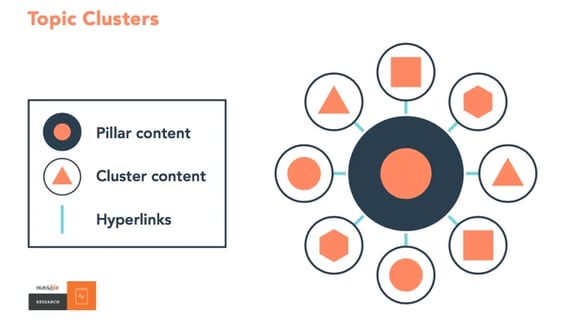Topic clusters and pillar pages are the key to a successful content marketing and inbound marketing campaigns. Grouping your content together this way is a proven method for:
- Achieving great rankings in the search results for a wide variety of keyword phrases around your main topic focus
- Attaining traffic to your site that is interested in your topic and relevant to your offering.
What is a topic cluster?

A topic cluster is a way of grouping content about a similar topic to a main pillar page about that topic.
For example, let’s say you provided HubSpot services as your core business, had a main service page on your website about HubSpot Portal Audits, and several blog posts about different things to audit in HubSpot. By linking those deep-dive impactful blog posts back to that main overview page, you’ve built yourself a topic cluster.
Why topic clusters work
Ranking for niche keyword phrases (i.e., content audit template HubSpot) is much easier than ranking for a more competitive and broader term (i.e., HubSpot audit) because they are less competitive and make it easier to have high keyword relevancy. It also helps that niche posts are more likely to get backlinks to them as other people talk about and refer to your highly specific content.
The search value of these pages, which all link back to your main topic page, helps to boost the performance and visibility of that main topic page. If you do it right, you’ll end up with lots of niche pages that rank really well AND a main page that secures solid rankings in competitive markets - it’s a win all around! 🏆
Building topic clusters in HubSpot
In your HubSpot portal under Marketing > Planning & Strategy > SEO you’ll have access to the topic cluster tool. This tool gives you a visual representation of the different sub-topics and keywords that are a part of your main topic or theme.
HubSpot even gives you extra SEO insight as to which sub-topics and keyword to focus on by providing some keyword variation research and corresponding search volume.
While the built-in HubSpot tools are great, I’d strongly recommend supplementing this data with some additional keyword research. Ahrefs, SEMrush, Google Ads and Moz are just a few tools that will give you some alternative popular search phrases for the topic you’re looking to write about.
Here’s a look at what your topic cluster might look like when you’ve added in your sub-topics.
Add your corresponding blog posts & pages
With each keyword, you have the option to identify which content on your site is most relevant to that keyword. If you already have content related to these keywords on your site, add the existing URL for the page with the best match for each keyword phrase.
If you’re writing new content for each of these sub-topics as you go, add those URLs in as you publish the pages.
When you’re done, you’ll see which keyword phrases and sub-topics don’t have their own pages and you’ll know which content you still need to create. Alternatively, if you have multiple pages on the same topic you might want to merge them together or see how you can differentiate them so they’re not overlapping in keyword focus anymore. Don’t forget to add those redirects in HubSpot if you're removing old posts!
Run the numbers
After your campaign has been running and you have data collected from it, you’ll be able to see which content pieces are effectively driving traffic - and contacts. You can easily compare the traffic from different topic clusters by using the Traffic Analytics report and changing your view to “Topic Clusters”.
Keep going and keep improving!
As you get more visibility into your key traffic-driving and contact-generating topic clusters, you can identify further content topics that are going to move the needle for your business. Best of all, when you develop a solid SEO strategy like this, you’ll continue to generate organic traffic as long as that content exists on your website.
Need help getting started on your topic cluster strategy? We can help.



